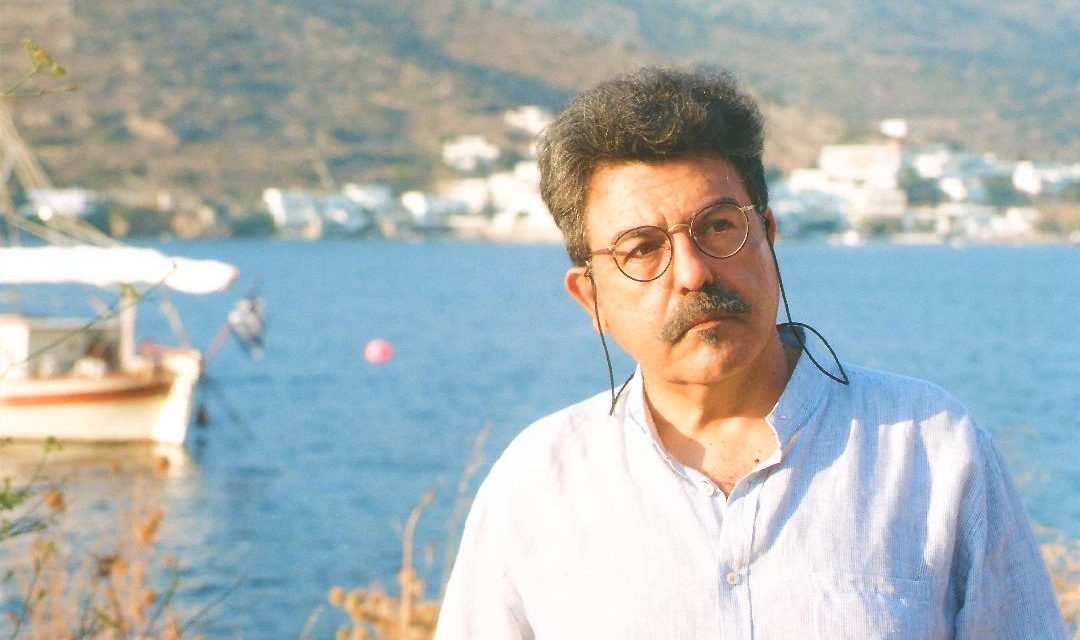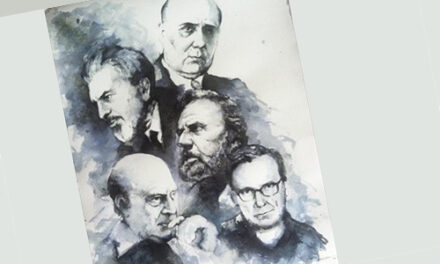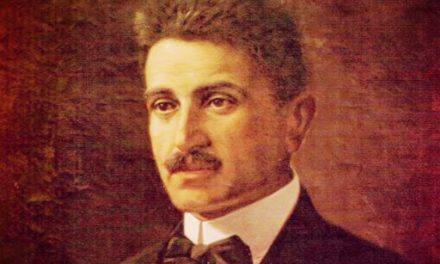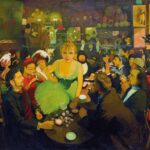Antonis Fostieris was born in Athens in 1953. He studied Law in Athens and History of Law in Paris. Since 1971 until today he has published ten collections of poetry, a complete edition of his collections and two albums with poetry and painting by A. Fassianos and Y. Psychopaidis. Twenty-five translations of his books have been published by reputable publishing houses abroad (England, France, Germany, Denmark, Italy, Albania, Croatia, Serbia, Romania, USA, Argentina).
His poetry is included in the High School textbooks of Modern Greek Literature (in Greece and Cyprus) and in many anthologies, while the record company ”Lyra/Dionysos” released the CD Antonis Fostieris recite Fostieris. In 2017, Aegean editions published the volume For Antonis Fostieris – Critical Essays, edited by Theodosis Pylarinos. He translated the Advice to a young poet by Max Jacob (1984).
He was the publisher and director of the magazine I Nea Poiissi (=The New Poetry, 1974-1976), co-director of the annual publication Poiissi (=Poetry, 1975-1981), co-publisher and director of the literary magazine I Lexi (=The Word, 1981-2010). He was awarded the Cavafy International Prize (1993), the Vrettakos Prize of the Municipality of Athens (1998), the State Poetry Prize (2004), the Poetry Prize of Diavazo magazine and, for the sum of his work, the Poetry Prize of the Academy of Athens (2010).
Since your first poetry collection in 1971 to fifty years later, what has changed and what has remained the same in your poetry? Which remains your driving force?
I would say that my lifelong interest in poetry itself and the emotions it evokes constitute my driving force. In addition, my belief that poetry has the ability to approach not only emotion but also thought in a comprehensive, in-depth way; not only experience, historical reality or memory but also imagination, intuition, the vast inland of the unconscious.
Indeed 2021 marks a fifty-year journey since, as a graduate student, Ι published my first poetry collection, The Big Journey. I certainly don’t want to repeat the usual clichés about how fast, how incredibly fast, these five decades have passed, and how much water has flowed in the river during this period. What I would like to say is that, as with the river of Heraclitus, the water has always been new, although the riverbed has remained the same. I have the impression that, at least thematically, as well as expressively, already my first poems, without being aware of it at the time, bore, in a concise or unconscious way, the seeds of most of what was to be written in the following years – a kind of an allegorical Bing Bang, where the original nucleus may have been gradually split in order to finally form a small poetic universe.
Αs for your question, I would say that numerous things have certainly changed from The Big Journey to my most recent collection Death, the Second (the thematic trunk has tossed a lot of branches and twigs in between, language, I hope, has become more dense and polysemous), yet this trunk has neither been cut nor dried, while language continues to retain its primary and distinct features. I am aware that one of the persistent demands of our time is constant change at all levels. In poetry, on the contrary, I consider that there is a request for an unchanging and recognizable voice, a personal style, a fixed way of looking, that one would wish to become a way of life.
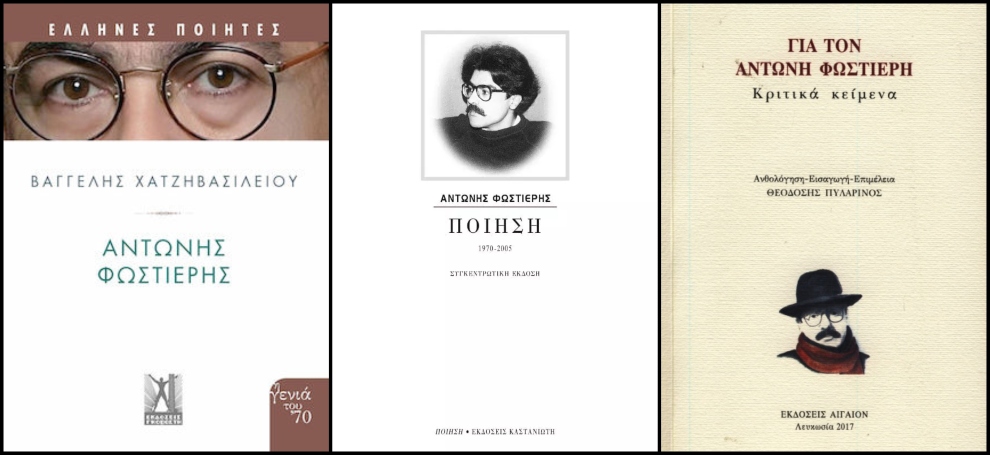
Do you consider that the originality of personal style constitutes an important element for a poetic work?
Definitely. I am not sure whether style can be identified with man himself, as Buffon argued, but the distinctiveness of style is a kind of fingerprint. Of course, much as important poets have a recognizable style that differentiates and characterizes them, I wouldn’t say that the opposite is also true. Personal style is not a benchmark: more or less all writers, regardless of value, have their distinct style, which not only reflects their ability but also their aesthetic perception for writing, regardless of whether this perception is always remarkable. Style becomes important when it goes beyond individuality and thus creates new and interesting forms of expression, either by the choice of vocabulary or by a special syntax or the imaginative use of the vast potential of language.
If you take a ready-made way of writing and imitate it, enrich it somewhat, modify it slightly and present it as your own proposal, the result may be in itself even better that the original. Yet, it is precisely the original conception and the ingenious formulation of the original that is of value. This is why I am opposed to the so often promoted by critics “need for renewal”, when it refers to poets who have conquered and consolidated a distinct tone of voice. This doesn’t necessarily mean that the poet has the right to turn this style into mannerism and copy himself in countless variations, but it is completely absurd to demand from him to renounce what constitutes its recognizable trace.
Literary critic Vangelis Hadjivassileiou has characterized you as one of the most introverted voices of your generation, “a poetic voice that struggles with introversion and philosophical contemplation“. Which are the main themes your poetry touches upon?
Poetry is, by nature, a holistic discourse. Aristotle, arguing that poetry has more philosophical features and a greater importance than history, explains that the former focuses more on the “general”, that is, on the universal principles that govern everything, while the latter on the “specific” namely, with the study of specific events. Τhis is by no way an absolute truth; it is known that there are forms of poetry that often refer to the concrete or the topical, but I must admit that I personally fully agree with the Aristotelian axiom, considering that in practice, I have rather adhered, albeit instinctively and without intention, to this “general”, to the extent possible.
If we were to trace some recurrent themes in my poetry, I would say that most have as their common denominator the timeless (and of course unanswered) ontological question, that is the origins of the world and existence, the underlying cause of every individual activity and phenomenon. This is exactly where I reckon “philosophical contemplation” mentioned by literary review, refers, given that ontology constitutes a field of inquiry primarily from the point of view of philosophical reflection. Perhaps this is the essence of the Aristotelian characterization of poetry as more philosophically wise than History: its common reflection with philosophy regarding the Being and the Non-being, the beginning and teleological aim of universal Creation, the meaning of life and the riddle of death.
The notion of time, either in the midst of emptiness and absence or as a solid and enclosed principle, seems to be of primary importance in your poetry. How is time defined in your writings? What role does the poetic language serve in this respect?
To define time, I could well answer in the words of St. Augustine: “I know very well what time is, as long as you do not ask me to explain it to you.” After all, poetry is not intended to explain and provide certainties, but to constantly seek explanations, even when they have already been given by the wise in the most convincing way. If, however, I wanted to infer a central idea of time, as emerged by the various references in my poems, that might have been a mixture of the three temporal dimensions, past, present and future, and their alloy in the instantaneous, fleeting point of the Moment. The present Moment is the only real dimension of time, in which the now non-existent Yesterday and the equally non-existence Tomorrow converge.
From another point of view, the perpetual motion of time can also be perceived as a constant stillness, as no one knows whether the universe remains stable in the flow of time, or if it is the one that travels through the realm of time. Nor can one say whether time is in fact a majestic poetic fantasy, a huge human deception, or whether it really exists, creating, transforming and destroying everything in its path, as we are accustomed to believe. (”Playing on stage time is transformed/ –The millions of faces in the bloody drama– / What a pity: / The only existence in the world can not / Suspect its solid existence”. From the poem “Logic, you are the end” of my collection Dark Eros).
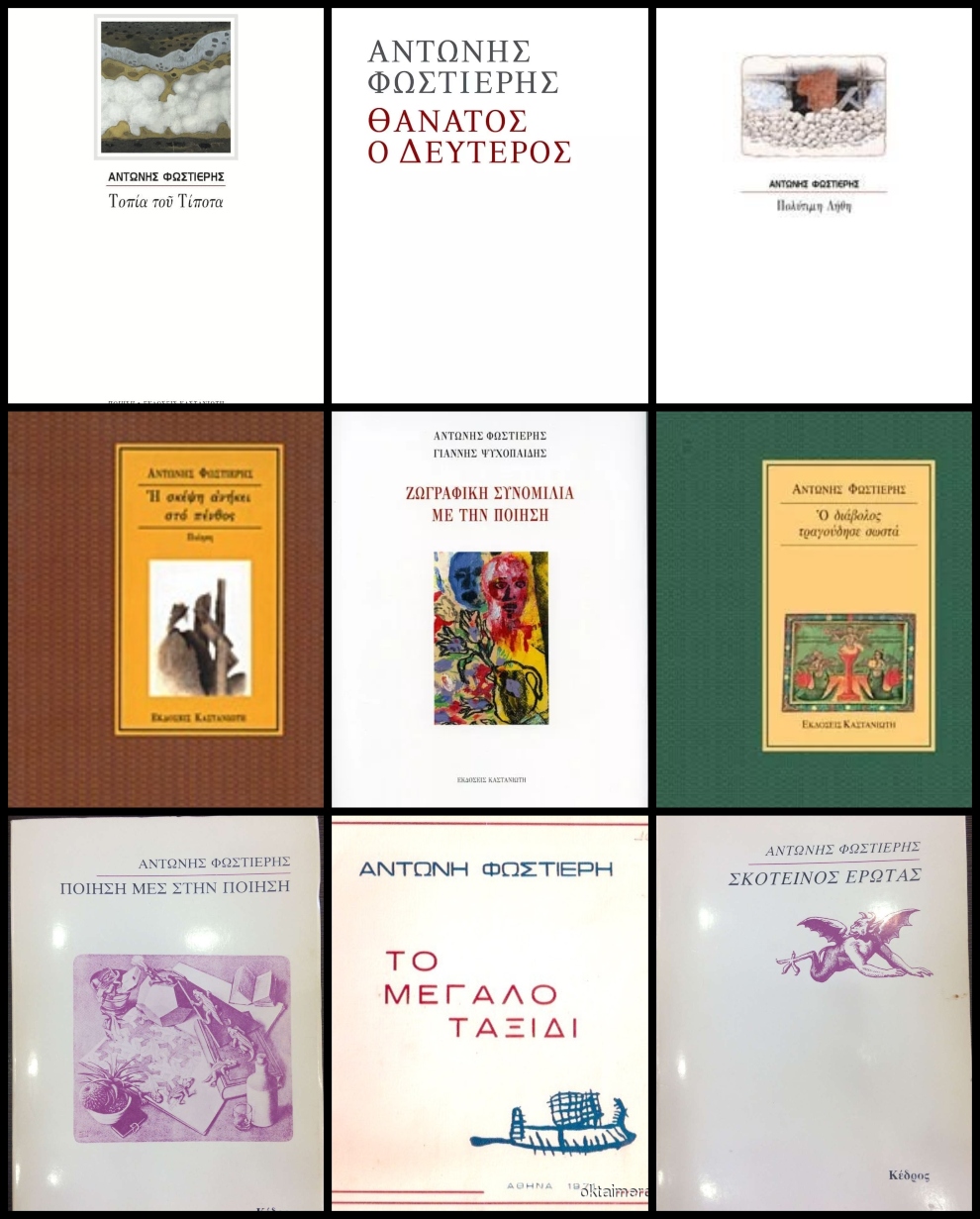
You have declared that “Poetry is not really an art of speech, but a peculiar art of silence”. Could you elaborate on that?
We all agree that the poetic speech is pre-eminently terse and condensed, a product of continuous distillations, in order to maintain what is essential and crucial, what will then be able to transmit the intensity of the aesthetic emotion. Thus, from the outset, the poem should (or at least try to) work on its material with extreme economy avoiding rhetoric, verbose analysis and description, traits that would transform it into a prose narration and thus weaken it. Verbal restraint, then, the prudent use of speech, is what makes poetry akin to silence, through the rejection of any unnecessary reference and its replacement by allusion and epigrammatism.
But as there is the art of speech, I would say that there is also an art of silence, even sui generis. Condensation and brevity also have their limits that, when exceeded, create the same or greater problems with lyrical chatter. When the speech shrinks to the point of dehydration, it becomes a hermetic and autistic speech, inaccessible to the reader to whom it is supposed to be addressed. Like Apollo who, through the priestess Pythia, spoke telegraphically and parabolically, so poetry “neither says nor hides, but means”. And if “neither says” is generally accepted, as an avoidance of verbosity, I think it’s “nor hides” that rather needs more attention, so that the poem does not stubbornly keep its meaning (the “signified” of semiotics) immersed in the darkness of inconceivability, but transmits it, in a “signifying” way and by aesthetic means, to the reader.
Many novelists as well as several poets write directly on the computer. What about you?
The computer came into my life quite late and, while I use its basic functions, the more specialized ones remain inaccessible to me. I understand its usefulness, I appreciate the great ease of access it provides, but I’m afraid that the power of habit will constantly create inhibitions and hold me back. I am not sure to what extent this has to do with our perceptions and experiences, but most likely it has to do with one’s character and idiosyncrasy. Although my attitude is far from ‘ideological’, I find it difficult to part from writing on paper, which of course at times becomes very tiring. I write a poem five, ten, twenty, sometimes thirty times, without considering the numerous minor changes I make by cutting and gluing pieces of paper on the verses, replacing, adding or removing some points, so that the manuscript often looks like a strange palimpsest. I copy the latest version to the computer – which very rarely remains the last.
There are many writers who kept a diary, from Stendhal, Kafka and Hemingway to Drosinis and Seferis. Do you keep a diary on a daily basis, or rather when there is something important that deserves to be recorded?
I do neither. I think it is useless to reproduce everyday events by recording them as simple diary entries. I am also quite cautious towards those poems that function as diary pages or photo albums, where emotions and images of current life are stored, unadulterated and unprocessed. Life moments belong to life. You have to experience them as such, in full consciousness and intensity; not to mummify them and embed them in the pages of diaries or poetry collections. Writing is a supplement (sometimes a substitute) for life. Not its photographer.
For decades you have been the co-editor and director of I Lexi (=The Word) magazine. Tell us about your project. What was it that made the magazine stand out and last?
The director of a literary magazine has a role similar to that of a theatre director. He may have pre-designed a performance, yet if a troupe doesn’t meet certain standards, the artistic result will certainly be inferior. In this respect, what made I Lexi stand out may have been to some extent the basic orientation and the direction of its character, but the main reason certainly was the high level of collaborators who honoured it with their texts. Indeed, a large number of collaborators, of all generations and all trends, constantly updated, with a work that represented the most interesting, serious and at the same time lively version of contemporary literature.
With its 205 issues, I Lexi became a kind of ark, saving a treasure of poetic, prose, essay and critical texts, which reflect the character of their time, but also with a quality that ensures their timeless value. The fixed structure of the magazine through all these years, its aesthetic appearance, the fact that each issue was illustrated entirely by a Greek painter, a different one every time, the circulation of multi-page tributes to important people and major literary issues, the commentary of the intellectual movement of the time and the supervision of adjacent artistic fields (theatre, cinema, visual arts) are perhaps some more features that helped I Lexi to leave its indelible mark in the field of literary publications, to earn the love of its readers (which allowed it to reach an unprecedented circulation of 8,000 issues) and to last for three whole decades of continuous presence, from the beginning of 1981 until the end of 2010.
You belong to the so-called generation of the ’70s, the generation of doubt. What differentiates this generation from what preceded and what followed?
As I have said before on a similar occasion, I don’t think that what our generation brought to Art constitutes an unbridgeable gap between us and our predecessors or successors, nor that our position is far from theirs. In fact, even now I am not entirely sure whether there really was a common and distinct feature that characterized, consistently and throughout the decades, the whole (or even the majority) of our generation, beyond a teenage-like and revolutionary mood for reversals. We were never homogenized, and those of our senior colleagues who tried in a paternalistic way to lead us towards a certain direction, completely failed.
Even if such traits, which gave our generation the characterization of “the generation of doubt”, in fact existed, they were never common to all of us, nor did they always have the same goal. Some focused on questioning the historical, political and social reality, others put this dispute within an ideological framework; for some the focal point was the alienation and conformity of modern man, for others certain philosophical and ontological pursuits, while for some others the resurgence of older ‘avant-gardes’, or the poetic language itself (given that it was widely accepted that the generation of the 1970s was mostly a poetic generation).
What is certain is that a creative electricity was floating in the atmosphere, and that we were all in a frenzy, a mood of rearranging the world around us and within us, which really brought an air of renewal to poetry. An air of denial of some established structures, which all of us felt, and expressed, each through his/her own perception and in his/her own special way. So maybe, despite our differences, all these various denials were turned into a common affirmation in the end. And perhaps the thematic and expressive parallel, which has been drawn between us, still carries, as a common feature, a spirit of constant search behind appearances, a mood to question the infallible projected by the external aspect of things, and a relentless search for their essence.
What role that poetry is called to play in an age that is predominantly antipoetic? Poetry as an “autonomous act” or with a “social mandate”? Is poetry a guide to survival in a time of multi-dimensional crisis?
I do not know if our times can be characterized as generally antipoetic, mainly because I doubt if there was any other radically different era, which proceeded with poetry as its survival guide and flag bearer. Nor do I have the illusion that poetry could fulfil such a momentous mission, or that this should be its role; I cannot even guess what this would mean in practice. What I have come to realize, however, and not without surprise, is that over time the content of “social mandate” tends to become, albeit tacitly, poetry as an “autonomous act” – probably in the hope that as an “autonomous act” it could more effectively fulfil its “social mandate”! I do not wish to tell marvels or to play with concepts. Experience has quite clearly showed that whenever art has been compelled to express orders from above or from the outside, that is, explicitly expressed or even internalized “social orders”, the artistic result has often been frustrating and certainly far from influential. Εngagement, any engagement –not just political and ideological– works only when it is done on a voluntary basis, based on genuine personal interest, which then gives a work its strength and authenticity.
*Interview by Athina Rossoglou
TAGS: LITERATURE & BOOKS | READING GREECE

